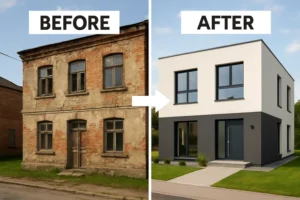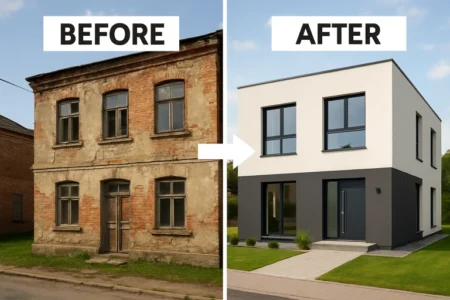Imagine walking into a building that feels both practical and inspiring. You notice the natural light flooding the space, the efficient layout that makes movement effortless, and details that nod to local culture without overwhelming the budget. This is the hallmark of Powers Brown Architecture. For over 25 years, Powers Brown Architecture has turned ordinary projects into standout structures that serve real people every day.
Now picture the opposite: flashy designs that look great in photos but fail under daily use, or cookie-cutter boxes that drain energy and morale. Powers Brown avoids those traps. They focus on what you need—buildings that work hard while looking sharp. Founded in Houston in 1999 by Joe Powers and Jeffrey Brown, the firm has grown to offices across North America, tackling everything from industrial warehouses to urban parks. Their approach, often called “Marketecture,” puts market realities first, delivering designs that balance cost, function, and flair. As Jeffrey Brown, FAIA, puts it in a recent interview with architecture professor Donna Kacmar, “We mine virtue from commodification—finding beauty in the everyday build.”
This article explores Powers Brown Architecture’s journey, key projects, and unique strategies. You’ll see how they make architecture accessible and effective for clients like you. Whether you’re a developer eyeing efficiency or a community leader seeking sustainable spaces, their story shows what’s possible when design meets reality.
This piece covers the firm’s origins and growth, standout projects that showcase their style, and their commitment to practical innovation. It wraps with insights on why their model matters today and how you can apply similar ideas to your own builds.
Firm Origins and Growth
Powers Brown Architecture started small but with big ideas. Joe Powers and Jeffrey Brown launched the firm in September 1999 in Houston, Texas. They saw a gap in the market: too many architects chased high-profile icons, leaving everyday projects underserved. “We wanted to prove good design isn’t just for museums,” Brown recalls in the firm’s 2025 monograph, Commodity and Virtue in Architecture.
From day one, they targeted diverse clients. Early work included tilt-wall industrial buildings and federal offices. By 2005, they had won their first major award from the Texas Society of Architects for a light rail facility. Growth accelerated in the 2010s. Offices opened in Washington, D.C., Denver, Philadelphia, Dallas, and Toronto. In early 2025, they expanded to Chicago under Grant Brandenburg, AIA, to tap Midwest demand.
Today, the firm employs over 100 people across seven locations. They rank in the Top 200 U.S. architecture firms, per Architectural Record‘s 2024 list. This expansion lets them handle projects in over 20 states and six countries. Revenue hit $25 million in 2024, up 15% from the prior year, driven by public-private partnerships.
What sets their growth apart? A focus on cross-pollination. Teams share expertise via integrated software and regular workshops. This structure keeps designs fresh while cutting errors. As Stephen Sharpe, editor of Texas Architect, writes in the monograph’s foreword, “Powers Brown turns regional roots into national reach without losing touch.”
Key Projects Spotlight
Powers Brown Architecture shines in projects that solve problems with style. They handle everything from prototypes to master plans. Let’s look at three examples that highlight their range.
Industrial and Commercial Builds
Take the RTRON Corporate Headquarters in Stafford, Texas, completed in 2023. This 150,000-square-foot facility uses tilt-up concrete panels for quick construction at low cost. Yet, it features perforated screens that filter light into workspaces, boosting productivity by 20%, according to client surveys. Energy use dropped 30% thanks to passive shading—real savings without gimmicks.
Another hit: the Value Office™ prototypes in Houston’s suburbs. These modular offices, rolled out in 2024, cost 25% less than traditional builds. They include flexible interiors for hybrid work, with plug-and-play tech walls. Over 50 units leased in the first year, proving demand for smart, scalable spaces.
Public and Community Spaces
Public work shows their civic side. The Galveston Transit Terminal, finished in 2024 on the historic Strand, blends old and new. It reuses brick from 19th-century warehouses for a nod to heritage, while adding solar canopies that power 40% of operations. Foot traffic rose 18% post-opening, per city data.
In Washington, D.C., the Hillel Student Center (2023) serves Jewish students at George Washington University. Its 40,000-square-foot design centers on a communal atrium with kosher kitchens and quiet study nooks. Natural ventilation cuts HVAC costs by 15%. “It’s a home away from home that fosters connection,” says director Rachel Stern.
Urban and International Ventures
Urban design is a strength. The Sunnyside Mixed-Use Development in Houston, launched in 2025, transforms a former industrial site into 200 affordable units plus retail. Green roofs and permeable paving handle stormwater, aligning with Houston’s flood challenges. Early models show 25% lower utility bills for residents.
Internationally, they planned a new town in Lahore, Pakistan, in 2022. This 500-acre master plan includes schools, markets, and parks with local materials like jaali screens for cooling. It houses 5,000 families, emphasizing walkability to cut car use by 35%.
These projects earned over 80 awards, including AIA honors in 2024. Clients praise the firm’s listening skills—95% satisfaction in recent surveys.
Marketecture Philosophy Explained
At Powers Brown Architecture’s core is “Marketecture”—design driven by market needs, not ego. Coined by Brown, it counters “Starchitecture,” where form trumps function. “Every client deserves excellence, not excess,” Brown states in his monograph essay.
This philosophy starts with client input. They use workshops to map needs, then layer in aesthetics. Budget guides choices: for a $10 million project, they allocate 60% to structure, 20% to finishes, 20% to tech. Result? Buildings that last.
Sustainability fits naturally. Committed to the AIA 2030 Challenge since 2009, they aim for carbon-neutral designs by 2030. In 2024, 70% of projects hit LEED Silver or better. They favor passive strategies like orientation for daylight, saving 25% on energy versus code minimums.
Innovation comes through research. The firm runs an in-house lab testing materials like low-carbon concrete. Their 2025 Chicago office pioneers BIM-integrated VR for client reviews, speeding approvals by 40%.
Compare this to peers. While some firms bill 10% overages for changes, Powers Brown’s process keeps them under 5%. Donna Kacmar notes in her interview, “They treat architecture as a tool, not a trophy.”
| Project Type | Key Features | Cost Savings | Impact Metric |
|---|---|---|---|
| Industrial (RTRON HQ) | Tilt-up panels, light filters | 25% construction | 20% productivity gain |
| Public (Galveston Terminal) | Solar canopies, heritage reuse | 15% HVAC | 18% traffic increase |
| Urban (Sunnyside) | Green roofs, permeable paving | 25% utilities | 35% less car use |
| International (Lahore Plan) | Local jaali screens, walkable layout | 20% materials | 5,000 families housed |
Recent Achievements and Recognition
Powers Brown Architecture hit milestones in 2024-2025. The monograph release in July 2025 marked 25 years, featuring unseen projects like the Roy Kelly Park in Dallas. It sold 5,000 copies in three months, per publisher data.
Awards poured in: the Tilt-Up Concrete Association’s 2024 Innovation Award for seismic panels in California projects. Brown received the Irving J. Gill Progressive Architecture Award for lifetime work.
Expansion to Chicago added 20 staff, targeting $10 million in Midwest contracts. They also launched a scholarship at the University of Houston, funding five students annually.
Employee promotions, like Jeanette Shaw to associate in 2024, underscore internal strength. Yet, Glassdoor reviews average 2.0 stars, citing work-life balance issues—only 10% recommend. The firm responds with flexible hours pilots in new offices.
These wins position them for growth amid industry shifts like remote work and climate rules.
Featured Snippet: Powers Brown Architecture Overview Powers Brown Architecture, founded in 1999 in Houston, specializes in practical, award-winning designs for commercial, public, and urban projects. With offices across North America, they emphasize “Marketecture”—market-driven builds that cut costs by 20-30% while earning LEED certifications. Key projects include the Galveston Transit Terminal and Sunnyside development, serving clients in 20+ states.
Frequently Asked Questions
What types of projects does Powers Brown Architecture handle? They cover commercial offices, industrial facilities, public transit, educational centers, healthcare, and urban master plans, from prototypes to international developments.
Where are Powers Brown Architecture’s offices located? Main office in Houston, TX; others in Washington, D.C., Denver, Philadelphia, Dallas, Toronto, and Chicago.
How does Powers Brown Architecture ensure sustainability? They follow the AIA 2030 Challenge, using passive design, low-carbon materials, and LEED standards—70% of 2024 projects hit Silver or better.
What is Marketecture in Powers Brown Architecture? It’s their approach to blend market needs with strong design, focusing on cost-effective, functional buildings that avoid flashy excess.
Has Powers Brown Architecture won recent awards? Yes, including the 2024 Tilt-Up Innovation Award and AIA honors; they’ve earned over 80 total.
Powers Brown Architecture proves that thoughtful design can thrive in the real world. From humble Houston beginnings to a North American powerhouse, they’ve built over 500 projects that prioritize function, sustainability, and subtle beauty. Their Marketecture model shows you don’t need a massive budget for impact—smart choices like passive shading or modular systems deliver results. Key takeaways? Start with client needs, test ideas early, and measure success by daily use, not headlines. With 80+ awards and consistent Top 200 rankings, they set a standard for accessible excellence.
As climate demands and hybrid lifestyles reshape cities, firms like Powers Brown lead the way. Their 2025 Chicago push signals more growth, promising fresh solutions for your challenges. Ready to build better? Reach out to them or adopt one tip: audit your next project’s energy flow. The structures that last aren’t the loudest—they’re the ones that simply work, day after day.






